- Home
- Thornton Wilder
Theophilus North Page 2
Theophilus North Read online
Page 2
The FIRST, the earliest, made its appearance during my twelfth to my fourteenth years. I record it with shame. I resolved to become a saint. I saw myself as a missionary among primitive peoples. I had never met a saint but I had read and heard a great deal about them. I was attending a school in North China and the parents of all my fellow-students (and my teachers in their way) were missionaries. My first shock came when I became aware that (perhaps covertly) they regarded the Chinese as a primitive people. I knew better than that. But I clung to the notion that I would be a missionary to a really primitive tribe. I would lead an exemplary life and perhaps rise to the crown of martyrdom. Gradually during the next ten years I became aware of the obstacles in my path. All I knew about sainthood was that the candidate must be totally absorbed in a relationship with God, in pleasing Him, and in serving His creatures here on earth. Unfortunately I had ceased to believe in the existence of God in 1914 (my seventeenth year), my view of the intrinsic divinity in my fellow-men (and in myself) had deteriorated, and I knew that I was incapable of meeting the strictest demands of selflessness, truthfulness, and celibacy.
Perhaps as a consequence of this brief aspiration I retained through life an intermittent childishness. I had no aggression and no competitive drive. I could amuse myself with simple things, like a child playing on the seashore with shells. I often appeared to be vacant or “absent.” This irritated some; even valued friends, both men and women (perhaps including my father), broke with me charging me with “not being serious” or calling me a “simpleton.”
The SECOND—a secularization of the first—was to be an anthropologist among primitive peoples and all my life I have returned to that interest. The past and the future are always present within us. Readers may observe that the anthropologist and his off-shoot the sociologist continue to hover about this book.
The THIRD, the archaeologist.
The FOURTH, the detective. In my third year at college I planned to become an amazing detective. I read widely in the literature, not only in its fictional treatment, but in technical works dealing with its refined scientific methods. Chief Inspector North would play a leading role among those who shield our lives from the intrusions of evil and madness lurking about the orderly workshop and home.
The FIFTH, the actor, an amazing actor. This delusion could have been guessed at after a consideration of the other eight ambitions.
The SIXTH, the magician. This aim was not of my seeking and I have difficulty in giving it a name. It had nothing to do with stage-performance. I early discovered that I had a certain gift for soothing, for something approaching mesmerism—dare I say for “driving out demons”? I understood what a shaman or a medicineman probably relies upon. I was not comfortable with it and resorted to it seldom, but as the reader will see it was occasionally thrust upon me. It is inseparable from a certain amount of imposture and quackery. The less said about it the better.
The SEVENTH, the lover. What kind of a lover? An omnivorous lover like Casanova? No. A lover of all that is lofty and sublime in women, like the Provençal Troubadours? No.
Years later I found in very knowledgeable company a description of the type to which I belonged. Dr. Sigmund Freud spent his summers in a suburb of Vienna called Grinzing. I was spending a summer in Grinzing and without any overtures on my part I was invited to call at his villa on Sunday afternoons for what he called Plaudereien—desultory conversations. At one of these delightful occasions the conversation turned upon the distinction between “loving” and “falling in love.”
“Herr Doktor,” he asked, “do you know an old English comedy—I forget its name—in which the hero suffers from a certain impediment [Hemmung]? In the presence of ‘ladies’ and of genteel well-brought-up girls he is shy and tongue-tied, he is scarcely able to raise his eyes from the ground; but in the presence of servant girls and barmaids and what they are calling ‘emancipated women’ he is all boldness and impudence. Do you know the name of that comedy?”
“Yes, Herr Professor. That is She Stoops to Conquer.”
“And who is its author?”
“Oliver Goldsmith.”
“Thank you. We doctors have found that Oliver Goldsmith has made an exemplary picture of a problem that we frequently discover among our patients. Ach, die Dichter haben alles gekannt!” (“The poet-natures have always known everything.”)
He then went on to point out to me the relation of the problem to the Oedipus complex and to the incest-tabu under which “respectable” women are associated with a man’s mother and sisters—“out of bounds.”
“Do you remember the name of that young man?”
“Charles Marlow.”
He repeated the name with smiling satisfaction. I leaned forward and said, “Herr Professor, can we call that situation the ‘Charles Marlow Complex’?”
“Yes, that would do very well. I have long looked for an appropriate name for it.”
Theophilus suffered, as they say (though there was no suffering about it), from that Hemmung. Well, let other fellows court and coax, month after month, the stately Swan and the self-engrossed Lily. Let them leave to Theophilus the pert magpie and the nodding daisy.
The EIGHTH, the rascal. Here I must resort to a foreign language, el picaro. My curiosities throw a wide net. I have always been fascinated by the character who represents the opposite of my New England and Scottish inheritance—the man who lives by his wits, “one step ahead of the sheriff,” without plan, without ambition, at the margin of decorous living, delighted to outwit the clods, the prudent, the money-obsessed, the censorious, the complacent. I dreamt of covering the entire world, of looking into a million faces, light of foot, light of purse and baggage, extricating myself from the predicaments of hunger, cold, and oppression by quickness of mind. These are not only the rogues, but the adventurers. I had read, enviously, the lives of many and had observed that they were often, justly or unjustly, in prison. My instinct had warned me and my occasional nightmares had warned me that the supreme suffering for me would be that of being caged and incarcerated. I have occasionally approached the verge of downright rascality, but not without carefully weighing the risk. This eighth ambition leads me into my last and overriding one:
The NINTH, to be a free man. Notice all the projects I did not entertain: I did not want to be a banker, a merchant, a lawyer, nor to join any of those life-careers that are closely bound up with directorates and boards of governors—politicians, publishers, world reformers. I wanted no boss over me, or only the lightest of supervisions. All these aims, moreover, had to do with people—but with people as individuals.
As the reader will see, all these aspirations continued to make claims on me. As they were conflicting they got me into trouble; as they were deep-lodged their fulfillment often brought me inner satisfaction.
I was now free after four and a half years of relative confinement. Since my trip abroad, six years earlier, I had kept a voluminous Journal (from which the present book is largely an extract, covering four and a half months). Most of the entries in this Journal were characterizations of men and women I knew, together with as much of the life-story of each as I could learn. Myself was present for the most part only as witness—though occasionally an entry was devoted to an ill-digested bit of self-examination. I might almost say that for the last two years the center of my life had become that gallery of portraits. Only years later did I come to see that it was a form of introspection via extrospection. It’s wonderful the way nature strives to create harmony within ourselves.
From the moment I resigned, two days before leaving the school, I discovered that several things were happening to me in my new state of freedom. I was recapturing the spirit of play—not the play of youth which is games (aggression under the restraint of rules), but the play of childhood which is all imagination, which improvises. I became light-headed. The spirit of play swept away the cynicism and indifference into which I had fallen. Moreover, a readiness for adventure reawoke in me—for risk,
for intruding myself into the lives of others, for extracting fun from danger.
It happened that in 1926 it became possible for me to enter upon my new liberty earlier than I expected. Six weeks before the school’s term-end an epidemic of influenza declared itself in central New Jersey. The infirmary filled up and overflowed. Beds were installed in the gymnasium which soon looked like a lazaret. Parents drove down and took their sons home. Classes came to an end and we masters were free to leave and I set out at once. I did not even return to my home in Connecticut since I had so recently enjoyed the Easter vacation there. I had bought a car from a fellow-master, Eddie Linley, on the condition that I take possession of it at his home in Providence, Rhode Island, after he’d driven it there from our school in New Jersey. I had known the car well for some time. It had belonged to the tutoring camp in New Hampshire where Eddie was also on the staff. Like all the masters we had taken turns in driving the students—usually in the larger vehicles—to church or to dances or to the motion pictures. This smaller car, known as “Hannah”—from the then popular song “Hard-hearted Hannah”—was used for short routine trips into the nearest village to the post office, to the grocery store, to the doctor, and occasionally to carry a few masters to a little applejack sociable. Hannah had known long service and was breaking up. Two years before, the directors of the camp had sold it to Eddie for fifty dollars. Eddie was a born mechanic. Poor Hannah asked only to lie down in a New Hampshire gully, but Eddie kept resuscitating her. He knew her “ways”; he “favored” her. She carried him to and from New Hampshire, Rhode Island, and New Jersey. I offered him twenty-five dollars for her on condition that he would give me some superficial instruction against emergencies. He agreed to this and I drove him to Trenton and back, Hannah responding admirably. He invited me to join him on his trip to Providence, but I told him that I wanted to spend a night in New York and would call at his home the next day. He consented to transport two suitcases and some books of mine—the inconsiderable possessions I had accumulated during my years at the school. These included the last two volumes of my precious Journal. I went to New York carrying a light handbag. From that Tuesday noon I was all free.
I felt then that New York was the most wonderful city in the world and now, about fifty years later, I am of the same opinion. I already knew and loved many others: Rome and Paris, Hong Kong and Shanghai, where I had passed a part of my boyhood; I was later to feel no stranger in London, Berlin, Rome, and Vienna. But none have equaled New York in its diversity, its richness in surprises, and in its climate.
Its extraordinary climate contains not only those extremes of hot and cold, but those radiant days of sunlight in the intense cold and those delightful days of temperate weather with which it is blessed in July and August. Moreover I believed (and still believe) in the theory, published from time to time by so-called authorities, that there is a sort of magnetic band about a hundred miles wide and a thousand miles long extending under the soil from New York to Chicago. Persons living in that area are animated by a galvanic force; they are alert, resourceful, optimistic, and shortlived. The diseases of an overtaxed heart abound. They are offered and must accept the choice of Achilles: a brief but buoyant life as against a bland and uneventful one. Men, women, and children are aware of this force rising from the pavements of New York and Chicago—and the cities between them—particularly in spring and autumn. It has been reported by entomologists that even ants walk more quickly in this area.
I had planned to spend the night—as so often—in the national clubhouse of the fraternity to which I had belonged during my student days at Yale University and I had tried to plan an engagement for the evening. I had telephoned certain friends in New York from my school in New Jersey:
“Good morning, this is Dr. Caldwell of Montreal speaking. May I speak to Mrs. Denham?”
The butler answered. “Mrs. Denham is in North Carolina, sir.”
“Oh, thank you. I shall call when I’m next in New York.”
“Thank you, sir.”
“Good morning, this is Dr. Caldwell of Montreal speaking. May I speak to Miss LaVigna?”
“W’ich’a Miss’a LaVigna, Anna or Grazia?”
“Miss Grazia, please.”
“Grazia no live here no more. She have a job in Newark. The ‘Aurora Beauty Parlor’—in the telephone book.”
“Thank you, Mrs. LaVigna. I’ll call her there.”
These disappointments were so acute that I altered my plan. I changed trains in New York and proceeded immediately to Providence. I put up at a hotel and called for my car at Eddie Linley’s house the next afternoon.
I had no very clear idea of how I would pass the summer. I had been told that one could live inexpensively in the province of Quebec. I would stop a short time in the Boston area which I scarcely knew, look at Concord, Walden Pond, Salem; then drive north through Maine, write a postcard to my father from his birthplace . . . something like that.
It was enough that I was to be at the wheel of my own car with the roads of the northern hemisphere before me . . . and four months without a single engagement to be met.
The Nine Cities of Newport
So in the early afternoon I called at Eddie Linley’s home to pick up Hannah and my possessions that were stored in her. I asked him to sit beside me as I drove about the city and to instruct me again in the old car’s idiosyncrasies.
Suddenly I saw a sign: “NEWPORT, 30 MILES.”
Newport! I would revisit Newport where seven and eight years earlier I had served—modestly enough, from private to corporal—in the Coast Artillery defending Narragansett Bay. During my free hours I had taken many long walks over the region. I had come to love the town, the bay, the sea, the weather, the night sky. I knew only one family there, hospitable friends who had heeded the injunction to “Invite a Serviceman to Sunday Dinner,” and I had received a favorable impression of the townspeople. There had been little to see of the much-publicized resort of the very wealthy; their residences were boarded up and under gas-rationing few wheels were turning on Bellevue Avenue. On seeing the sign an idea occurred to me as to how I might earn my daily expenses with a part-time activity without drawing on my savings. I then returned Eddie to his door, shook hands with the members of his family, paid him the twenty-five dollars, and drove off to Newport on the island of Aquidneck.
Oh, what a day! What promises of a still-retarded spring! What intimations that I was approaching the salt sea!
Hannah behaved pretty well until we got within the city limits when she started coughing and staggering. We persevered and reached Washington Square, where I stopped to inquire the location of the Young Men’s Christian Association—not the “Army and Navy Y,” right before me, but the civilian “Y.” I entered a store selling newspapers, postcards, etc. (The family that ran it will reappear in this history in the chapter entitled “Mino.”) I telephoned the “Y” asking if there was a room available. I added buoyantly that I was under thirty, had been christened in the First Congregational Church in Madison, Wisconsin, and that I was fairly sociable. A weary voice replied, “That’s all right, buddy—calm down! Fifty cents a night.” Hannah objected to going further, but was persuaded to enter Thames Street. I brought her to a stop at “Josiah Dexter’s Garage. Repairs.” A mechanic examined her long and thoughtfully and uttered some words that were unintelligible to me.
“How much would that cost?”
“Fifteen dollars, looks like.”
“Do you buy old cars?”
“My brother does. Josiah! Josiah! Jalopy for sale!”
This was in 1926 when all mechanics, electricians, and plumbers were not only reliable but were held in high esteem as props of the self-respecting household. Josiah Dexter was much older than his brother. He had one of those faces one sees now only in daguerreotypes of judges and parsons. He too examined the car. They conferred together.
I said, “I’ll sell you the car for twenty dollars, if you drive me and my luggage to the ‘Y.’
”
Josiah Dexter said, “Agreed.”
We transferred my luggage into his car and I was about to climb in when I said, “Wait a minute!” The air made me giddy. I was about a mile from where I had spent a part of my twentieth and twenty-first years. I turned back to Hannah and stroked her hood. “Goodbye, Hannah,” I said. “No hard feelings on either side—see what I mean?” Then I whispered into her nearest headlight: “Old age and death come to all. Even the weariest river winds its way to sea. As Goethe said, ‘Balde ruhest du auch.’ ”
Then I took my place beside Mr. Dexter. He drove a block slowly and then said, “Had that car long?”
“I have been the owner of that car for one hour and twenty minutes.”
Another block, “Do you get worked up about everything you own?”
“Mr. Dexter, I was stationed at Fort Adams during the War. I’m back here. I’ve now been in Newport for a quarter of an hour. It’s a beautiful day. It’s a beautiful place. I’m a little light-headed. Sadness is just around the corner from happiness.”
“May I ask what it was you said to the car?”
I repeated what I had said, translating the German ending, “ ‘Soon, you too will rest.’ Those are commonplace remarks, Mr. Dexter, but I have come to see lately that if we shrink from platitudes, platitudes will shrink from us. I never sneer at the poems of Henry Wadsworth Longfellow who spent so many happy weeks in and near Newport.”
“I know that.”
“Can you give me the address of an establishment that rents bicycles?”
“I do.”
“Then I shall be at your garage in an hour to hire one. . . . Mr. Dexter, I hope that my light-headedness has not offended you?”
“We New Englanders don’t go in for light-headedness much, but I’ve heard nothing to be offended at. . . . What were the words that German said again?”
“In a poem he was talking to himself, late at night, in a tower-room, a deep forest all around him. He wrote them with a diamond on a windowpane. They are the last words of the most famous poem in the German language. He was in his twenties. He got his rest at eighty-three.”

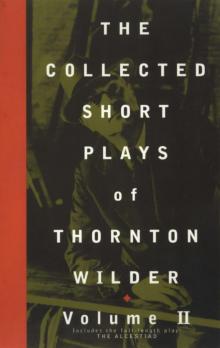 The Collected Short Plays of Thornton Wilder, Volume II
The Collected Short Plays of Thornton Wilder, Volume II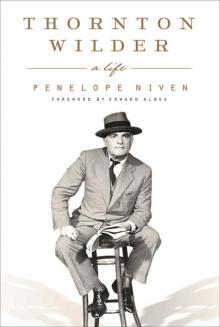 Penelope Niven
Penelope Niven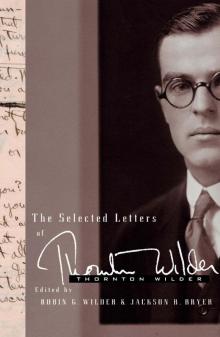 The Selected Letters of Thornton Wilder
The Selected Letters of Thornton Wilder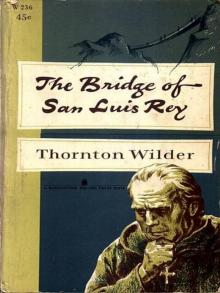 The Bridge of San Luis Rey
The Bridge of San Luis Rey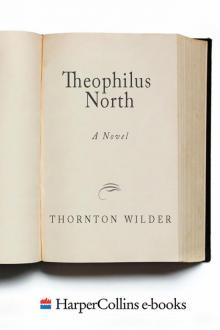 Theophilus North
Theophilus North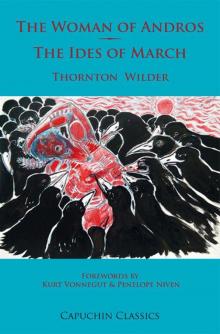 The Woman of Andros / the Ides of March
The Woman of Andros / the Ides of March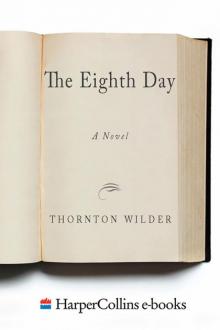 The Eighth Day
The Eighth Day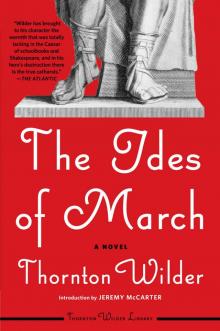 The Ides of March
The Ides of March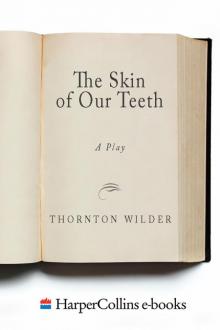 The Skin of Our Teeth
The Skin of Our Teeth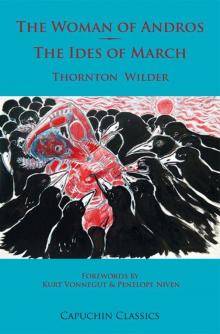 The Woman of Andros and The Ides of March
The Woman of Andros and The Ides of March